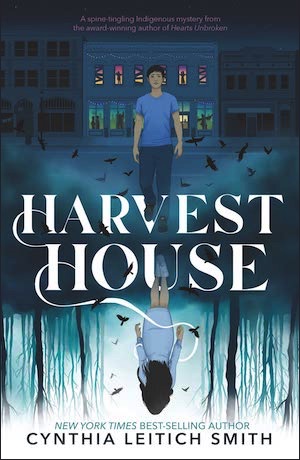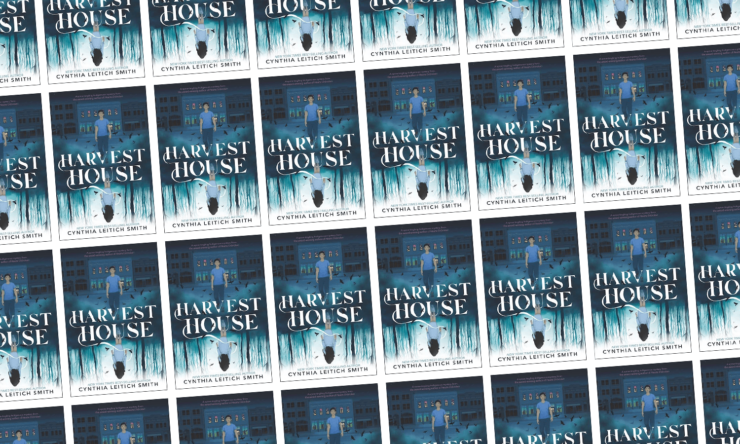It may be spring, but there’s never a bad time for a haunted Halloween tale. Cynthia Leitich Smith ventures into supernatural mystery territory with her latest YA fantasy Harvest House. Get ready for ghosts, fighting racism, and a dash of high school romance.
Not too long ago, the Wolfe family, tribally enrolled members of the Muscogee Nation, relocated from Texas to Kansas. Louise Wolfe dealt with anti-Indigenous racism at school the year before, then headed off to college. Her younger brother Hughie is now a sophomore and dealing with more of the same. Ms. Fischer, a white woman in town, comes up with the clever idea to fundraise for her medical issues by running a haunted house in a long-shuttered business in downtown, and Hughie and his new friend Sam Rodríguez volunteer to help. At first, it’s all fun and games, but soon enough some unpleasant stereotypes make their way into the event. An “Indian burial ground” with offensive names on the headstones becomes the main act of the event, with an “Indian maiden” as its centerpiece. The urban legend of the Crossroads Ghost the maiden is referencing is based on a real event: decades before, a young Indigenous woman named Celeste disappeared at the crossroads where the haunted house is being held.
Buy the Book


Harvest House
As he’s trying to figure out how to talk Ms. Fischer out of perpetuating offensive stereotypes, young brown women are being hassled at the same crossroads as Celeste. Sam’s older sister Ximena is the latest in a long line of young women who hear a man approach them whispering “Less, less, less!” or have wild animals jump out at them. Hughie’s dogs go bonkers at the crossroads one afternoon, and cold spots mysteriously appear and disappear. Is there really a ghost? Or just a series of wacky coincidences? With the help of his friends, family, and Marie, the cute girl from around the way, Hughie must find out what happened at the crossroads all those years ago and save Halloween from supposedly well-meaning but ultimately harmful white people.
A lot of YA fantasy nowadays revolves around destroying an evil empire/leader/organization (for what I hope are obvious reasons). These kinds of stories also often remove parents and elders from the narrative, usually by killing them off or having them abandon their children. These same books also tend to lean way past the 350 page mark, with epic set pieces and action sequences. Don’t get me wrong, I’m not complaining. I love those books. Many of my favorite YA fantasies from the last few years have those same plots and tropes. But it’s also nice to have some YA fantasy that explores other topics and tones. Here, Hughie’s family and extended Indigenous community are all very much involved in his quest to untangle the crossroads mystery. This is not a book about one teen taking on the world but of a community working together to heal.
In Harvest House, the stakes may be lower, but they are no less important. This isn’t a story where the world is ending or a wicked overlord is obsessed with the main character. Hughie is just trying to live his life honestly and do what he believes is right. Sometimes that means refusing to perform in a racist play, and sometimes it means helping the spirit of an Indigenous woman find peace in death. The world won’t end if he fails, but he’ll know things weren’t set right. Most teens aren’t saving the world between classes, they’re in positions like Hughie is in. They have the chance to step up to the hard thing because it’s the right thing or take the easy way out and carry the guilt. Teens need to see that they have a choice, and that they aren’t making that choice alone. They can (hopefully) rely on their friends and family to support, guide, and encourage them.
It’s also a story about the responsibility of the majority and the power of privilege. White people are constantly making decisions about and for Indigenous people without asking actual Indigenous people what they want. Hughie has to suffer through white people insisting their racist depictions and commentaries are just meaningless fun even when he insists they aren’t. Marie has to put up with her white boss exploiting the death of an Indigenous woman to turn a profit at his restaurant. Celeste, the Crossroads Ghost whose story we learn more about in her first-person POV chapters, has control of her very life taken by white men, leaving her bound forever to the place where she disappeared. Each Indigenous person in this novel wants to live their life, but even something as frivolous as Halloween can become a minefield for a marginalized person. It’s easy for someone in a position of power to make a mistake or unintentionally cause harm. What we do next is what matters most. Do we double down and use our allyship as cover—“I can’t be racist, I have a [x] friend”, “it’s just a feathered headdress, it doesn’t mean anything”, “actually, we’re honoring the dead Indigenous girl by turning her into an attraction and keeping all the money for ourselves”—or do we acknowledge the harm, make restitution, and do better in the future?
I keep trying to think of issues with this novel, but the few things that stuck out are so minor that I honestly didn’t mind them. Mostly, I loved Harvest House. From the story to the characters to the physical act of reading it, it was enjoyable all the way down. It even made me want to go back and read the rest of this literary universe (it involves characters from Rain Is Not My Indian Name and Hearts Unbroken).
I’ve often said we need more YA that caters to younger teens and is under 300 pages. Cynthia Leitich Smith’s latest fits the bill perfectly. Harvest House would make a great reading double feature with Darcie Little Badger’s 2020 YA fantasy Elatsoe. Both offer ghost stories with plucky, thoughtful Indigenous teens confronting white supremacy, anti-Native racism, and the patriarchy with the support of their community. Even with its heavier themes, this novel was refreshing and comforting.
Harvest House is published by Candlewick Press.
Alex Brown is a Hugo-nominated and Ignyte award-winning critic who writes about speculative fiction, librarianship, and Black history. Find them on twitter (@QueenOfRats), instagram (@bookjockeyalex), and their blog (bookjockeyalex.com).










